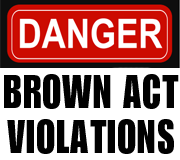Ashcraft’s Misstep Results in Apparent Brown Act Violation
 California Government Code 54950 otherwise known as the Ralph M. Brown Act mandates that municipal councils and other legislative bodies conduct their deliberations openly. The Brown Act also states that:
California Government Code 54950 otherwise known as the Ralph M. Brown Act mandates that municipal councils and other legislative bodies conduct their deliberations openly. The Brown Act also states that:
“The people of this State do not yield their sovereignty to the agencies which serve them. The people, in delegating authority, do not give their public servants the right to decide what is good for the people to know and what is not good for them to know. The people insist on remaining informed so that they may retain control over the instruments they have created.”
With regard to how the Brown Act treats e-mail communications specifically, one publication noted that “the attorney general has issued an opinion concluding that ‘[a] majority of the board members of a local public agency may not e-mail each other to develop a collective concurrence as to action to be taken by the board without violating the Ralph M. Brown Act.”
That same publication offered several tips for avoiding problems when using e-mail including:
- Refrain from replying to an e-mail if the reply will be directed to a majority of the council.
- Refrain from taking a position or making commitments on matters yet to be decided by the council
- If e-mailing the entire council, do so only to provide information … Do not communicate your position on a matter pending before the council to all other members of the council.
Three days prior to the recent Council meeting where the item to dismiss Mr. Plourde from the Library Commission was heard, Ashcraft sent an e-mail to the entire Council and members of the City executive staff. The e-mail was sent in response to a communication from the City Manager notifying the Council of the addition of the item to the agenda and reads as follows:
“I’m sorry to hear he just doesn’t get it. I totally agree with this action, especially after speaking with him during the time the mayor had him in and seeing his reaction to what we discussed.”
When pressed at the meeting whether the e-mail constituted a violation of the Brown Act, Assistant City Attorney Patrick Sullivan declined to answer stating that, “I don’t give advice to the public … if the Council would like me to answer I can … the Council and the City is my client.” Apparently nobody on the Council wanted Sullivan to answer the question during the meeting as they passed on the opportunity to ask him to respond.
Ashcraft the “Republican” seems to have gotten into the spirit of the Torrance Way. That didn’t take long.
whack jobs